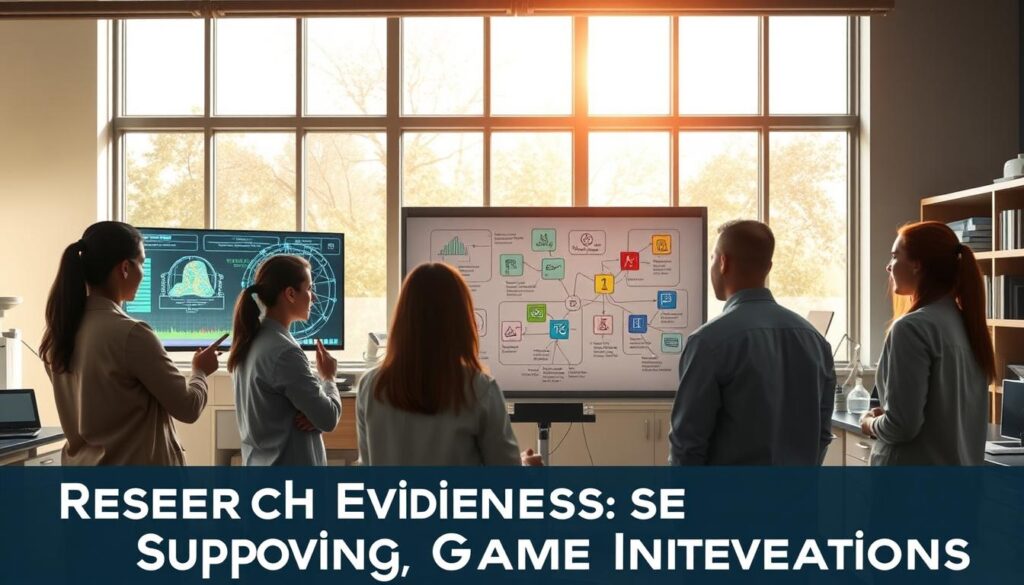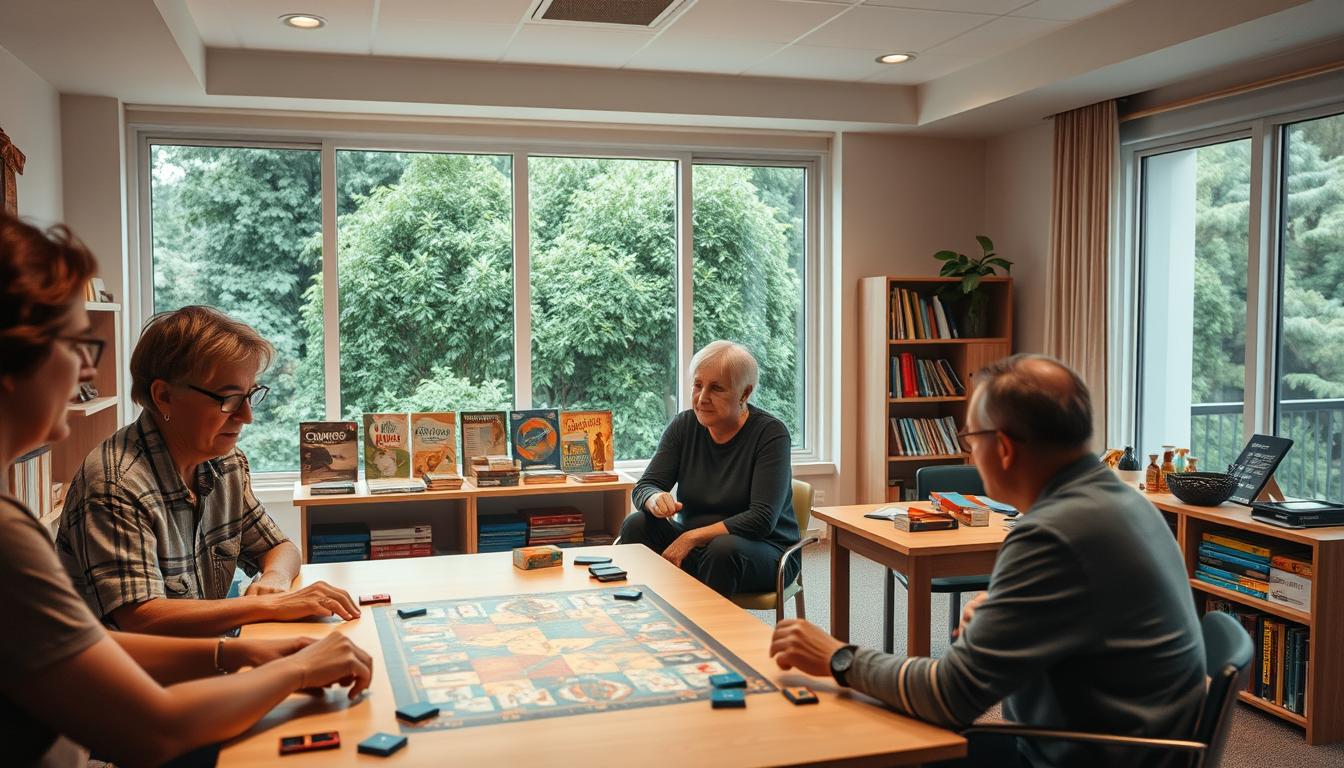Educational games supporting adults in emotional and mental rehabilitation
Ever thought about how games can change emotional and mental health for adults? Educational games are now key in therapy. They make learning fun and help people recover, think better, and want to keep going with therapy.
This article looks at how mental health games and emotional games help people get better. We’ll see how these games can support recovery and meet big therapy goals. Let’s explore how they work and their benefits for those facing mental health issues.
The Importance of Emotional and Mental Rehabilitation
Emotional and mental rehabilitation is key for adults dealing with mental health issues. More people are facing mental disorders, making it crucial to address these problems. Sadly, many go without treatment, showing a big gap in care.
Working on emotional rehabilitation helps a lot in getting better mentally. It’s about creating supportive spaces and using new ways to improve well-being. This way, people can take back control of their lives, leading to a better quality of life and strength against future problems.
New tools like games can help in therapy. They offer a fresh way to get involved in recovery, something traditional methods might not do. As we move forward, trying out different mental health approaches is vital for lasting emotional and mental healing.
Understanding Mental Health Challenges in Adults
Mental health challenges include depression, anxiety, and PTSD. These conditions affect how adults feel and interact with others. They can make everyday tasks hard, showing the need for good treatment.
Many adults don’t get the mental health help they need. This problem highlights the need for new ways to care for mental health. Games and interactive tools might help meet the needs of those with mental illness.
As our world changes, we must focus on mental health. Using fun and engaging tools can help people recover. This support is crucial for those facing mental health issues.
How Educational Games Can Aid Rehabilitation
Educational games are key in mental rehabilitation. They create fun environments that encourage active learning. This helps in emotional and cognitive growth.
These games make therapy engaging. They offer challenges and stories that match users’ lives. This makes the experience more meaningful and effective.
Games also use rewards to keep users motivated. This approach boosts commitment to rehabilitation plans. It makes therapy more effective and leads to better mental health outcomes.
The Benefits of Using Games for Mental Health Interventions
Using games in mental health therapy has many benefits. Games make therapy more fun, which helps patients stick to their treatment plans. This is key to keeping them in the program longer.
Games help people feel a sense of accomplishment. This motivates them to keep going with their therapy. They also help people make friends, which is important for those feeling lonely during treatment.
Games also help improve thinking skills. Players learn to solve problems and think creatively. These skills are important for mental health and fit well with therapy goals.

| Benefits of Games in Therapy | Description |
|---|---|
| Increased Engagement | Higher levels of participation in treatment activities, reducing dropout rates. |
| Improved Adherence | Patients are more likely to follow treatment plans when they incorporate game elements. |
| Enhanced Cognitive Functioning | Games promote skills such as problem-solving, critical thinking, and decision-making. |
| Social Connection | Multiplayer games create opportunities for building relationships and peer support. |
| Sense of Achievement | Completing in-game challenges boosts self-esteem and motivation to engage in therapy. |
Educational Games for Adults in Mental Rehabilitation
Educational games are now key tools for adults in mental rehab. They come in many types, each with its own role in tackling mental health issues. These games use various methods to engage users and aid in their recovery.
Types of Educational Games for Mental Health
There are six main types of educational games for mental health:
- Exergames: Mix physical activity with fun games to boost wellness.
- Virtual reality games: Create deep, calming experiences that reduce stress.
- Cognitive behavior therapy-based games: Help change negative thoughts through play.
- Biofeedback games: Let players understand their body’s responses and learn to control them.
- Entertainment games: Make learning fun by adding mental health lessons.
- Cognitive training games: Improve memory and focus through interactive challenges.
Mechanisms of Change Through Gameplay
These games work in several ways to help in rehab. Players often feel:
- Immersion: Being fully in the game helps distract from bad feelings.
- Flow experiences: Finding the right challenge level boosts enjoyment and focus.
- Behavioral modeling: Seeing positive actions in games can inspire real-life changes.
- Cognitive engagement: Solving puzzles sharpens problem-solving skills.
- Real-life application: Skills learned in games can help in daily life, aiding recovery.
Exergames and Their Role in Rehabilitation
Exergames are a mix of gaming and physical activity. They make physical therapy fun and engaging. Studies show they help older adults with depression, who might find regular exercise hard.
Playing these games can boost your mood. They offer a fun way to stay active, which is good for your mind. This makes it easier to keep up with a fitness routine.
Exergames adjust to your skill level, making them safe and encouraging. This helps build confidence and reduces anxiety. As you get better, you get feedback that keeps you motivated. They’re a great way to improve your health in many ways.
Incorporating Virtual Reality in Therapeutic Gaming
Virtual reality therapy is changing the game in treating mental health issues like PTSD and anxiety. It lets users face their fears in a safe space. This helps them process emotions and learn to cope.
VR offers a safe place to deal with triggers. People can handle situations that feel too big in real life. This boosts their ability to handle stress and helps them grow stronger.
VR also makes treatment more engaging. Unlike old methods, it keeps users hooked and involved. It makes them explore and understand their fears better.
Cognitive Behavioral Therapy (CBT) and Serious Games
Cognitive behavioral therapy (CBT) is a key part of mental health care. It helps change negative thoughts and behaviors. Serious games for therapy combine CBT with fun games, offering a new way to tackle mental health issues.
These games let players explore real-life challenges in a safe space. They help players learn to handle tough situations better. This makes therapy more engaging and helps players feel more invested in their mental health.
Studies show that serious games can improve therapy results. People using these games often feel more confident and open. This shows how combining technology with therapy can lead to better mental health outcomes.
Board Games as a Tool for Mental Health Improvement
Board games are now seen as a great way to improve mental health. They help with emotional well-being and thinking skills. Playing these games is a fun way for adults to tackle mental health issues.
Studies show that games like chess and Scrabble boost thinking and social skills. They help players think strategically, remember things, and work together. This can lead to less anxiety and depression.
There are many games made to help with mental health. They’re not just for fun but also for learning and growing. Playing with others can also make people feel more connected and part of a community.
Using board games to improve thinking is key for adults’ mental health. Games that make players think, solve problems, and work together help build strength. They’re a great addition to other treatments, offering a complete approach to mental health.
Research Evidence Supporting Game Interventions
Research on game interventions has caught the eye for its role in mental health treatments. Many studies show the promise of serious games and gamified therapy. They seem to work well for conditions like depression and anxiety.
As researchers dig deeper, they find that games can really help patients. They see better emotional states and coping skills. This shows how games can positively change lives.
Systematic Reviews and Findings
Systematic reviews are key in looking at study results. They give a detailed view of how games help in therapy. They show how games can change treatment and patient experiences.
Early studies suggest games could change mental health care. They make therapy more engaging. This helps in building a strong bond between patient and therapist.
| Study Focus | Methodology | Outcomes |
|---|---|---|
| Effectiveness of Serious Games | Randomized Controlled Trials | Significant decrease in anxiety levels |
| Gamified Interventions | Longitudinal Studies | Improved emotional resilience |
| User Engagement in Therapy | Qualitative Analysis | Enhanced participation and satisfaction |

Future Directions for Game-Based Mental Health Interventions
The future of therapeutic gaming looks bright. It’s set to bring new tools to mental health. With advanced technology, game-based therapy will get more personal.
More research is needed, focusing on what users want. This means making games that fit different needs and tastes.
Working together is key. Healthcare experts, game makers, and users must team up. This way, they can make games that really help.
By testing and improving games together, they’ll get better. This teamwork makes sure games are both useful and liked by those who use them.
New tech like AI and machine learning could change everything. They could make games that change based on how you feel. This could make therapy through games more effective and reach more people.
Conclusion
As we learn more about mental health, educational games are becoming key. They use technology to make therapy fun and interactive. This helps people grow and heal in new ways.
Today, there are many educational games for adults with different mental health issues. They use proven methods and meet each person’s needs. This makes treatment better and helps people feel supported.
In short, educational games are changing how we treat mental health. With more research, they will help people recover even better. They show that using technology in therapy is essential for healing.
FAQ
What are educational games and how do they support emotional and mental rehabilitation?
Educational games are interactive tools that help users learn and grow. They make therapy fun and engaging. This can boost motivation and help people stick to their treatment plans.
What types of mental health challenges can educational games address?
These games can help with many mental health issues in adults. This includes depression, anxiety, PTSD, and cognitive problems. They offer targeted help that can improve emotional stability and relationships.
How do exergames contribute to emotional and mental wellness?
Exergames mix physical activity with fun games. They help with both physical and mental health. Research shows they can lower depression and anxiety, especially in older adults, by encouraging movement and improving mood.
Can virtual reality games be effective for individuals with PTSD?
Yes, VR games can be very helpful for those with PTSD. They offer immersive experiences that let users face their fears safely. This can help them develop coping strategies and engage more in treatment.
How does incorporating cognitive behavioral therapy (CBT) principles into serious games benefit users?
Serious games like SPARX use CBT to help users deal with negative thoughts. This interactive approach makes therapy more engaging. It leads to better results than traditional CBT methods.
What role do traditional board games play in mental health improvement?
Board games like chess and Go can improve mental health. They boost critical thinking, memory, and social skills. This makes them great tools for mental health and treating depression.
What does research indicate about the effectiveness of educational games in mental health interventions?
Studies show educational games are effective in mental health care. They help with depression and anxiety. The field is growing, and early results are promising for improving mental health through games.
What are the future directions for game-based mental health interventions?
Future research should focus on making games more personal and using new technology. It’s important to work together with healthcare experts and game developers. This will help create better, more effective games for therapy.














